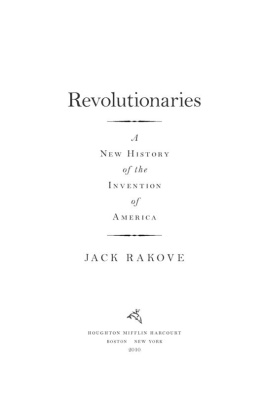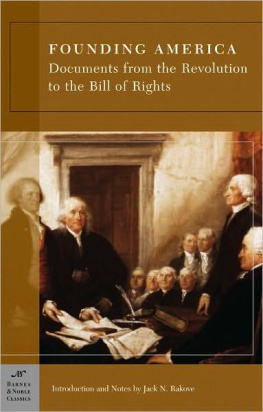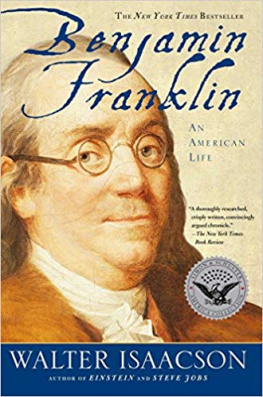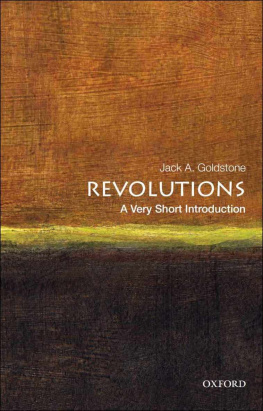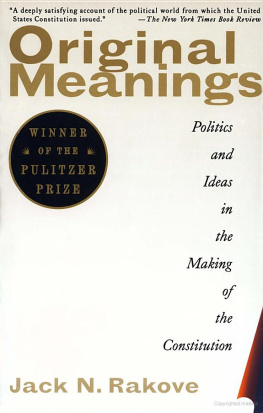HOUGHTON MIFFLIN HARCOURT
BOSTON NEW YORK
2010
Copyright 2010 by Jack Rakove
ALL RIGHTS RESERVED
For information about permission to reproduce selections from this book,
write to Permissions, Houghton Mifflin Harcourt Publishing Company,
215 Park Avenue South, New York, New York 10003.
www.hmhbooks.com
Library of Congress Cataloging-in-Publication Data
Rakove, Jack N., 1947.
Revolutionaries : a new history of the invention of America / by Jack Rakove.
p. cm.
Includes bibliographical references and index.
ISBN 978-0-618-26746-0
1. United StatesHistoryRevolution, 17751783. 2. Revolutionaries
United StatesHistory18th century. 3. StatesmenUnited States
History18th century. 4. United StatesIntellectual life18th century.
5. United StatesPolitics and government17751783. I. Title.
E 208. R 167 2010
973.3dc22
Book design by Brian Moore
Printed in the United States of America
DOC 10 9 8 7 6 5 4 3 2 1
For Bernard Bailyn,
the creative historian
Contents
Prologue: The World Beyond Worcester
PART I: THE CRISIS
1. Advocates for the Cause
2. The Revolt of the Moderates
3. The Character of a General
PART II: CHALLENGES
4. The First Constitution Makers
5. Vain Liberators
6. The Diplomats
PART III: LEGACIES
7. The Optimist Abroad
8. The Greatest Lawgiver of Modernity
9. The State Builder
Acknowledgments
Notes
Sources and Further Reading
Index
Prologue
The World Beyond Worcester
O N MARCH 15, 1756, a young schoolteacher in Worcester, Massachusetts, sat in his "great Chair at School," surveyed his pupils at work around him, and fancied himself "as some Dictator at the head of a commonwealth." That evening, in his diary, John Adams mused about his charges. In "my little school" he could find "all the great Genius's, all the surprizing actions and revolutions of the great World in miniature." Numbered among his students were "several renowned Generalls but 3 feet high, and several deep-projecting Politicians in peticoats." The whole variety of humankind was present, he boasted: "Kings, Politicians, Divines, L.D. [LL.D.'s?], Fops, Buffoons, Fidlers, Sychophants, Fools, Coxcombs, chimney sweepers, and every other Character drawn in History or seen in the world." It took a lively imagination to detect such diversity in the children of Worcester's farmers, all destined to follow in their parents' stolid ways. The teacher seemed content with his lot. "Let others waste the bloom of Life, at the Card or billiard Table." He would "rather sit in school, and consider which of my pupils will turn out in his future Life, a Hero, and which a rake, which a phylosopher, and which a parasite." It could not have occurred to him to ask which might become a revolutionary.
Still, the learning Adams had acquired at Harvard College in Cambridge was outrunning its uses in Worcester, and other professions already beckoned. Most Harvard men still entered the ministry, preaching the familiar biblical passages that generations of Puritan preachers had expounded to generations of New England farmersthough with out quite the fervor of their forerunners. Adams dutifully attended Sabbath worship, where the same minister who had lured him to Worcester held the pulpit. Only the day before the minister had spoken "all Day upon Abrahams Faith, in offering up Isaac." Two months later the teacher recorded some of the minister's favored expressions: "Carnal, ungodly persons. Sensuality and voluptuousness. Walking with God. Unregeneracy. Rebellion against God." Often Adams copied sermons into his commonplace book of instructive quotations. Yet his Christian beliefs were also lodged within the universe of Sir Isaac Newton, the great genius who had devoted obsessive years to searching scriptural study. "When we consider that Space is absolutely infinite and boundless, that the Power of the Deity is strictly omnipotent, and his Goodness without Limitation," Adams asked after one sermon, "who can come to a Stop in his Thoughts, and say hither does the Universe extend and no farther?"
Public events sparked similar reflections. "The last year is rendered conspicuous by a Series of very remarkable Events," Adams noted on July 22, 1756. Britain and France were warring for control of the Ohio Valley. Across the Atlantic "the british Nation has been making very expensive and very formidable Preparations" against a French invasion. A catastrophic minutes-long earthquake, followed by an equally massive tsunami, had leveled Lisbon the previous November, killing tens of thousands and inspiring thinkers as diverse as the French philosophes Rousseau and Voltaire and the founding preacher of Methodism, John Wesley, to rush into print their reflections on the meaning of the tragedy. The conventional religious moral Adams drew from these events lay closer to Wesley's repent-now spiritual lessons than to Rousseau's rational observations on the danger of packing population into large cities. "Is it not then the highest Frensy and Distraction," Adams asked, "to neglect these Expostulations of Providence and continue a Rebellion against that Potentate who alone has Wisdom enough to perceive and Power enough to procure for us the only certain means of Happiness"?
Although his religious views were more earnest than fervent, Adams wondered whether a career in the ministry would enable him "to do more good to his fellow men and make better provision for his own future Happiness." But that summer he committed his future to the law. "I am not without Apprehensions, but I am much less troubled with them than I was before I was determined what Profession to follow," he wrote to a Harvard friend. To his future brother-in-law, he confessed that "The Engines of frightful Ecclesiastical Councils, of diabolical Malice and Calvinistical good nature never failed to terrify me exceedingly whenever I thought of Preaching." A life in the law was one in which "I shall have Liberty to think for myself without molesting others or being molested myself."
Nine years later, newly wed to Abigail Smith, a prominent minister's very bright daughter, and with his legal practice prospering, Adams recorded a fresh threat to his serenity. His entry for December 18, 1765, only the fourth for the whole year, lamented "my Loss, in neglecting to keep a regular Journal" since spring. "The Year 1765 has been the most remarkable Year of my Life," made so by the spirit with which the colonists were opposing "That enormous Engine, fabricated by the british Parliament, for battering down the Rights and Liberties of America, I mean the Stamp Act"the controversial legislation for raising revenue by imposing a tax on every form of paper, from legal documents and newspapers to playing cards and calendars. Adams actively supported the resulting American protests, drafting resolutions for his Braintree townsmen and publishing several essays in the Boston Gazette. Rather than permit the stamped paper to be used in legal proceedings, as the act required, the protesting Sons of Liberty insisted that the courts simply close, effectively suspending much of the daily business of governance. Adams viewed the threat to American liberty in strikingly personal terms. "I was but just getting into my Geers, just getting under Sail, and an Embargo is laid upon the Ship," he wrote; "just become known, and gained a small degree of Reputation, when this execrable Project was set on foot for my Ruin as well as that of America in General, and of Great Britain."
The next day the town of Boston summoned Adams to join two more eminent attorneys, Jeremiah Gridley and James Otis, in an effort to persuade Governor Francis Bernard to ignore the Stamp Act and allow the courts to reopen. He was "wholly at a loss to conjecture" why he had been called on this errand. In Boston on December 20, he learned that Otis and Gridley expected their young associate "without one Moments Opportunity to consult any Authorities, to open an Argument, upon a Question that was never made before."
Next page
